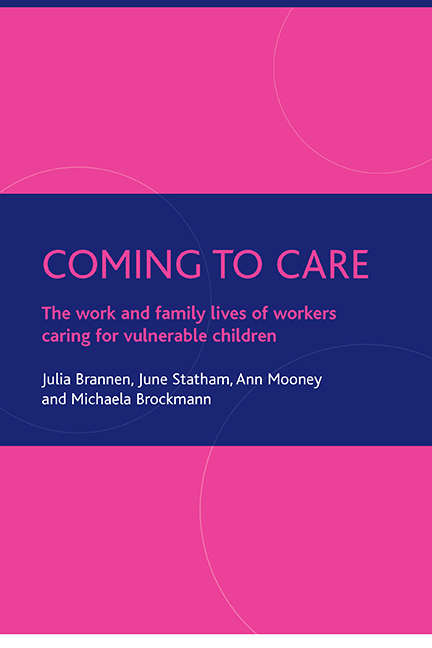Book contents
- Frontmatter
- Contents
- List of tables and boxes
- Acknowledgements
- one Setting the scene
- two The study
- three The origins of a care ethic in care workers’ childhoods
- four Entering care work with vulnerable children
- five Care workers’ careers and identities: change and continuity
- six What do vulnerable children need? Understandings of care
- seven Experiences of care work
- eight Leavers, movers and stayers
- nine Managing care work and family life
- ten Conclusions and policy implications
- Appendix: Boxes and additional tables
- References
- Index
Appendix: Boxes and additional tables
Published online by Cambridge University Press: 15 September 2022
- Frontmatter
- Contents
- List of tables and boxes
- Acknowledgements
- one Setting the scene
- two The study
- three The origins of a care ethic in care workers’ childhoods
- four Entering care work with vulnerable children
- five Care workers’ careers and identities: change and continuity
- six What do vulnerable children need? Understandings of care
- seven Experiences of care work
- eight Leavers, movers and stayers
- nine Managing care work and family life
- ten Conclusions and policy implications
- Appendix: Boxes and additional tables
- References
- Index
Summary
Box A1: Contextual information about the organisations from which postal survey sample was drawn
Authority A
London local authority. Foster care: around a 100 foster carers with an older age profile. High proportion of single parents. Fees lower than independent sector. Residential care: no units. Family support: 23 based in nursery/centres, fostering team and leaving care teams. Mixed age group. No difficulty with recruitment and retention. Community childminding: approximately 45 childminders in the scheme. Hourly rate less than for private work. Entitled to 5 days sick/dependency leave and 4 weeks paid holiday. Support includes regular home visits and helpline. Good support for training. Low turnover.
Authority B
Shire authority in South of England. Foster care: approximately 500 foster carers, mostly couples with an older age profile and White British. Neighbouring authorities and independent fostering agencies paying higher fees. Problems with recruitment rather than retention. Residential care: 12 residential units, which tend to be 6-bed and with approximately 14 staff. Running homes 1-3 (see Box A2). Family support: service reorganised and family support workers joined social work teams and became known as social services assistants. New post of social work assistant created, which many family support workers moved into. Community childminding: no organised scheme although one planned.
Authority C
Shire authority in South of England. Family support: around 100 family support workers, although now known as social work assistants. Predominately female with a mix of full-time and part-time workers, but variable working patterns. Originally all based in family centres, but some teams now work independently. Introduced a career structure with different grades and pay related to competence and qualifications. Diversification of role: for example offering support to foster carers, taking on ‘duty’ officer duties, working in crisis and asylum teams, although some resistance to diversification among workforce.
Authority D
Metropolitan authority in North of England. Community childminding: 32 childminders in scheme who tend to be older with older children. Experience taken into account when recruiting childminders to the scheme, but can and do recruit new childminders. Little difference between hourly rate for private and community placements. About half are registered for overnight care and can care for a child for 28 nights without registering as a foster carer. Turnover has been low. Regular visits to support childminders.
- Type
- Chapter
- Information
- Coming to CareThe Work and Family Lives of Workers Caring for Vulnerable Children, pp. 223 - 232Publisher: Bristol University PressPrint publication year: 2007



